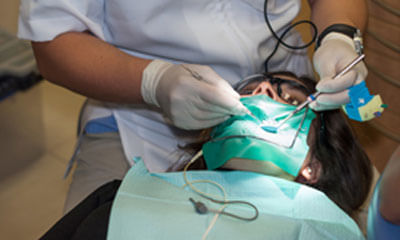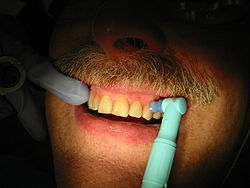After Complications Of Dental Cleaning
Teeth cleaning is part of oral hygiene and involves the removal of dental plaque from teeth with the intention of preventing cavities (dental caries), gingivitis, and periodontal disease. People routinely clean their own teeth by brushing and interdental cleaning, and dental hygienists can remove hardened deposits (tartar) not removed by routine cleaning. Those with dentures and natural teeth may supplement their cleaning with a denture cleaner.
Brushing
Careful and frequent brushing with a toothbrush helps to prevent build-up of plaque bacteria on the teeth.[1] Electric toothbrushes were developed, and initially recommended for people with strength or dexterity problems in their hands, but they have come into widespread general use. The effectiveness of electric toothbrushes at reducing plaque formation and gingivitis is superior for reducing plaque and gingivitis to that of conventional manual toothbrushes
Flossing
In addition to brushing, cleaning between teeth may help to prevent build-up of plaque bacteria on the teeth. This may be done with dental floss or interdental brushes.
80% of cavities occur in the grooves, or pits and fissures, of the chewing surfaces of the teeth,[3] however, there is no evidence currently showing that normal at-home flossing reduces the risk of cavities in these areas.
Special appliances or tools may be used to supplement toothbrushing and interdental cleaning. These include special toothpicks, oral irrigators, and other devices. A 2015 Cochrane review found insufficient evidence to determine whether the interdental brushing decreases the levels of plaque when compared to flossing.[5]
Scrubbing
Teeth can be cleaned by scrubbing with a twig instead of a toothbrush. Plant sap in the twig takes the place of toothpaste. In many parts of the world teeth cleaning twigs are used. In the Muslim world the miswak or siwak is made from twigs or roots that are said to have an antiseptic effect when used for cleaning teeth.
Professional teeth cleaning
Dental hygienist polishing a person's teeth
Teeth cleaning (also known as prophylaxis, literally a preventive treatment of a disease) is a procedure for the removal of tartar(mineralized plaque) that may develop even with careful brushing and flossing, especially in areas that are difficult to reach in routine toothbrushing. It is often done by a dental hygienist. Professional cleaning includes tooth scaling and tooth polishing and debridement if too much tartar has accumulated. This involves the use of various instruments or devices to loosen and remove deposits from the teeth.
As to the frequency of cleaning, research on this matter is inconclusive. That is, it has neither been shown that more frequent cleaning leads to better outcomes nor that it does not. A review of the research literature on the question concluded "[t]he research evidence is not of sufficient quality to reach any conclusions regarding the beneficial and adverse effects of routine scaling and polishing for periodontal health and regarding the effects of providing this intervention at different time intervals". Thus, any general recommendation for a frequency of routine cleaning (e.g. every six months, every year) has no empirical basis. Moreover, as economists have pointed out, private dentists (or other dental professionals) have an economic incentive to recommend frequent cleaning, because it increases their revenues.
Most dental hygienists recommend having the teeth professionally cleaned every six months. More frequent cleaning and examination may be necessary during treatment of dental and other oral disorders. Routine examination of the teeth is recommended at least every year. This may include yearly, select dental X-rays. See also dental plaque identification procedure and removal.
Good oral hygiene helps to prevent cavities, tartar build-up, and gum disease.
Complications
Overly vigorous or incorrectly performed brushing or flossing may cause injury to the gingiva (gums). Improper or over-vigorous brushing may cause sore gums, damage to tooth enamel, gingivitis, and bleeding gums. Dentists and dental hygienists can instruct and demonstrate proper brushing or flossing techniques.




+1.svg)
